Seattle drivers spend an average of 57 hours per year looking for parking, compared to a nationwide average of 17 hours. That’s too many hours! Luckily, with a few tricks and tips, finding parking in Seattle just got a whole lot easier.
Keep reading to learn the ins and outs of street parking in Seattle, as well as tips for overnight parking, metered parking, and free parking. Or, skip right ahead to the map to find parking near you right now.
General Seattle Street Parking Rules
To avoid expensive parking tickets handed out by the Seattle Police Department, learn about these general street parking rules:
- 72-Hour Rule: No parking on any city street for longer than three days straight.
- Drive for Uber or Lyft? Seattle issues Carpool Permits to allow carpool vehicles to park in specially designated high-traffic areas of the city.
- Look out for Peak Parking Restrictions – times of day when higher traffic than normal is expected. During these times, some street parking rates change, as well as time allowed to park there. Always check the signs nearest you before you park.
- Worried about Seattle street sweeping? Currently, the city does not issue parking tickets for cars that forget to move on their designated street sweeping day but asks that car owners voluntarily move their vehicles to keep Seattle’s street clean and safe.
Seattle curb colors and what they mean:
White Curb
A white curb can mean several things, either a passenger loading/unloading zone intended for quick drop-offs or a 24/7 reserved street parking space for police vehicles or fire department vehicles only.
Yellow Curb
A yellow curb can mean a loading or unloading zone, a truck-only loading zone, a commercial vehicle loading zone, or a taxi stand,
Red Curb
A red curb means tow-away zone. If you park here, you’re risking immediate impound.
Alternating Red and Yellow Curb
An alternating red and yellow curb means bus zone. Vehicles who park here are subject to parking tickets and an immediate tow.
Seattle Street Parking Signs and What They Mean

Angled Parking: This sign indicates whether drivers need to park at an angle, either head-in or back-in. This makes sure that cars don’t roll into traffic on inclined streets.

Food Truck Zones: These signs indicate that only permitted food trucks can park here during the days/times indicated on the sign.
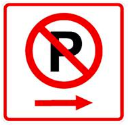
No Parking and No Stopping: When you see this sign, no parking or stopping is allowed, sometimes by time of day, or in advance of a stop sign or crosswalk.
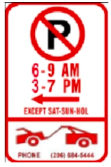
Peak Period Restriction: This sign indicates times when parking or stopping is not allowed during morning and afternoon commute times. Watch for this one, if you violate it you could be towed immediately.
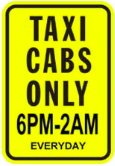
Taxi Zone: Only taxis can park here during designated times.
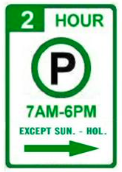
Time-limited parking: This sign tells you how much time you are allowed to park here. Payment is not required. When you move your car, you’re required to move it to a different block if parking again the same day.

After 5 PM Sign: You’ll see this sign on paid street parking spots. It indicates that the maximum time limit you can park here is 3 hours after 5 PM.
Best Value Signs:
Look for the green check mark on metered parking spots to find the Best Value parking with lower rates or longer time limits. These blocks may be a little farther from your destination but will likely have more parking available.
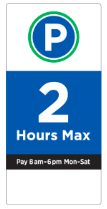
This sign indicates 2-hour parking from 8 AM to 6 PM Monday-Saturday
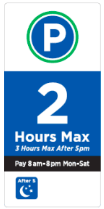
This sign indicates 2-hour parking from 8 AM to 5 PM, and 3-hour max after 5 PM.
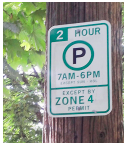 This Restricted Parking Zone Sign limits street parking to vehicle owners who currently hold an RPZ Parking Permit. If you live in a residential neighborhood that qualifies, you can apply for a permit online.
This Restricted Parking Zone Sign limits street parking to vehicle owners who currently hold an RPZ Parking Permit. If you live in a residential neighborhood that qualifies, you can apply for a permit online.
Where can I find free or cheap parking in Seattle?
There are many residential street parking spaces that are free throughout the week and a number of free spaces in the downtown area, though congestion can make those difficult to snag.
The easiest way to find free parking is by using this interactive parking map. Simply navigate to where you want to park or type in a destination in the search bar to see how much parking costs in that area, as well as garages and special parking restrictions nearby.
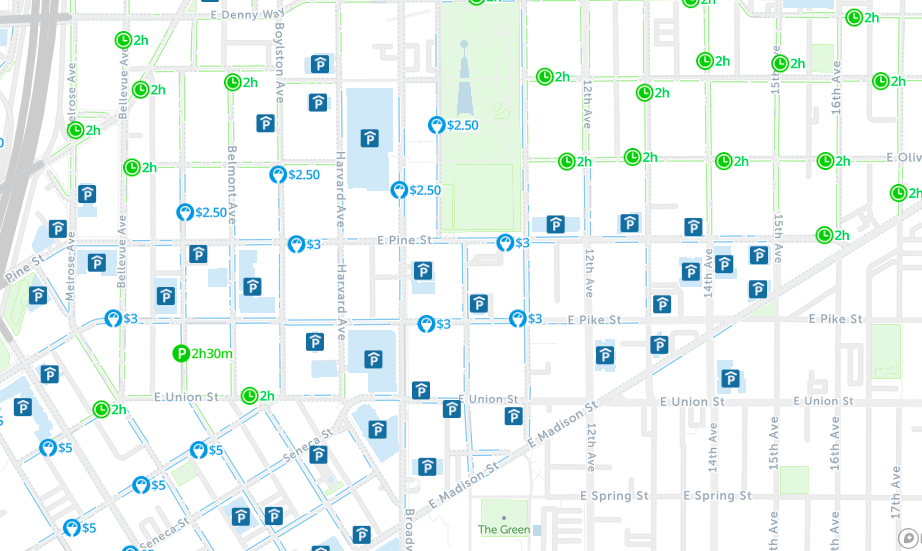
Heading downtown to an event? Here are some businesses that offer free parking for customers:
- Head to the Waterfront for three hours of 3 parking over the winter holiday.
- Ten garages in Seattle’s Retail Core offer flat rates of $7 or less to park all evening or all day on Saturdays and Sundays.
- Pike Place Market on the itinerary? Get an hour of free parking at the Public Market Garage, which is part of the low-rate program where you can park for $3/hour up to 4 hours.
- You can get four hours of parking free in select Pioneer Square garages during First Thursdays.
Okay, so how much do parking meters cost in Seattle?
Parking meters are in effect Monday through Saturday, and they are generally limited to 2 hours, 4 hours, or 10 hours. Parking is free on Sundays!
To see how much metered-parking costs during any given time, visit this parking map and type in your parking destination and time of day:
How does overnight parking work?
Street parking is free between 6 or 8PM-8AM, but finding a spot can be difficult if you’re in a highly trafficked area. But here’s a trick: from 10 p.m. until paid parking officially begins the next morning at 8 AM, Seattle’s pay stations are programmed to allow customers to pre-pay for the next morning’s parking if you’re hoping to park overnight and sleep in.
Or, if you park overnight on the street in a residential area with no parking limits, keep in mind that if your car is parked in the same spot for longer than 72-hours, you could face a parking ticket. Seattle also has many parking garages that offer overnight parking and long-term parking for residents and visitors.
What’s the cost of a parking ticket?
| Ticket Type | Fee Amount |
| No RPZ permit in a residential parking zone | $250.00 |
| Parking in a disabled space without a permit | $450.00 |
| Parking illegally in an alley or driveway | $47.00 |
| Parking in a loading zone | $47.00 |
| Parking in longer than the time allowed | $44.00 |
| Parking in a taxi zone | $47.00 |
| Leaving your car on the street for longer than 72 hours | $44.0 |
| Parking illegally in an electric vehicle charging station | $124.00 |
Towed or booted car? This is what to do!
If your car was towed from a Seattle street, use Lincoln Towing’s impound vehicle search to locate it. There is no storage fee for the first 12 hours that your car sits at the towing lot, but after 12 hours the fee is $14.40 for every additional 12-hour period.
When you pick up your vehicle, expect to pay at least $120.50, with additional added by the city as an administrative tax.
If your car has been booted under the Scofflaw Ordinance, which allows a boot to be placed on the vehicles of Seattle drivers who have four or more overdue, unpaid parking tickets, call 1-877-590-3757 and a technician will be out to release you upon payment of all parking tickets.
Seattle Parking Holidays
Seattle offers free parking on certain Holidays. But which Holidays are city-wide? Here are all of Seattle’s parking holidays:
| Start Date | Parking Holiday | End Date |
| 2025-01-01 | New Year's Day | 2025-01-01 |
| 2025-01-20 | Martin Luther King, Jr. Day | 2025-01-20 |
| 2025-02-17 | Washington's Birthday (Presidents' Day) | 2025-02-17 |
| 2025-05-26 | Memorial Day | 2025-05-26 |
| 2025-07-04 | Independence Day | 2025-07-04 |
| 2025-09-01 | Labor Day | 2025-09-01 |
| 2025-11-11 | Veterans day | 2025-11-11 |
| 2025-11-27 | Thanksgiving Day | 2025-11-27 |
| 2025-12-25 | Christmas Day | 2025-12-25 |
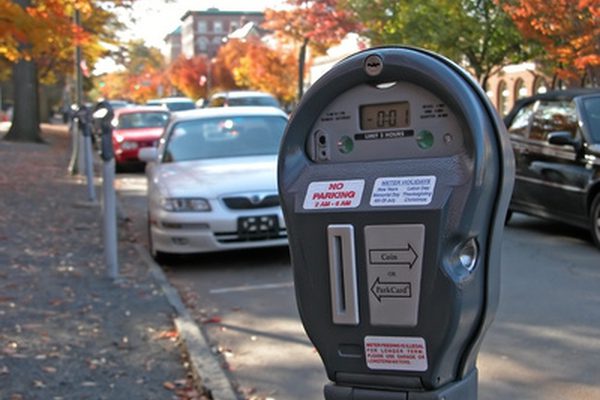
10 Comments
Hello! I have a question. If a parking sign says “2 hour parking 7am-6pm except by zone 10 permit,” does that mean if I purchase a zone 10 permit, I am able to park there anytime for up to 72 hours. But, if I don’t have a zone 10 permit, I can only park there for 2 hours from 7-6, ei. Not overnight? Meaning, to park overnight in a zone restricted area, you must have a permit for that specific zone, correct?
Thank you.
Right – it means the restrictions don’t apply if you have the permit. The catch is that you can only get the permit if you live within that zone. They put these in place so that residents can park in the are where they live without visitors taking up the spots for events or nightlife or whatever.
Yes, you’re correct! If you have a Zone 10 permit, you can park in that area for an extended period, even beyond the 2-hour limit, and potentially overnight, depending on the permit’s validity. The permit allows you to park anytime, as long as it’s in the Zone 10 designated area. Once you purchase it, you can upload it to your SpotAngels app, and the map will be filtered to your needs, email us at support@spotangels.com if have any questions!
I just got a ticket for parking in a handicap spot, which I will say I would never intentionally do..EVER. I get out of my car, and there is away to park sign as well as a no parking south of sign as well. I pay my 8.00 and come out, find the ticket and then see a sign that was blocked by a tree for a handicap space about 7-8 feet high. It looks like the handicap space was added and the other pay to park sign was not moved. So I am challenging that validity of the ticket. I don’t see how they can have two signs that say different things within a few feet of each other and be the same color as well. Any thoughts??
Hey Steffan! It sounds like you have a valid reason to challenge the parking ticket, can you please keep us updated at support@spotangels.com, we’d love to know if you were able to do so!
What are the rules
If you have a disability permit.
Does the two hour limit apply?
I advise you to email us at support@spotangels.com, with the exact address you’re interested to park in, our mapping team will explain everything in details, and clear out all of your doubts!
Do you know if the 72 hour rule applies to just the side of the block that you are parked? if I move to a spot on the back side of the same block, different street name and all is that far enough of a move? Do I literally have to move to a different square block to avoid ticketing?
Hey Jame! Yes, you need to move your vehicle to a completely different block. Moving to the back side of the same block, even with a different street name, is not enough to avoid ticketing.
I parked across the street from the cloud kitchen on 13th Ave capital hill area there wasn’t any signage for no parking the tickets was $65 I don’t see a 65 on the fees listed above